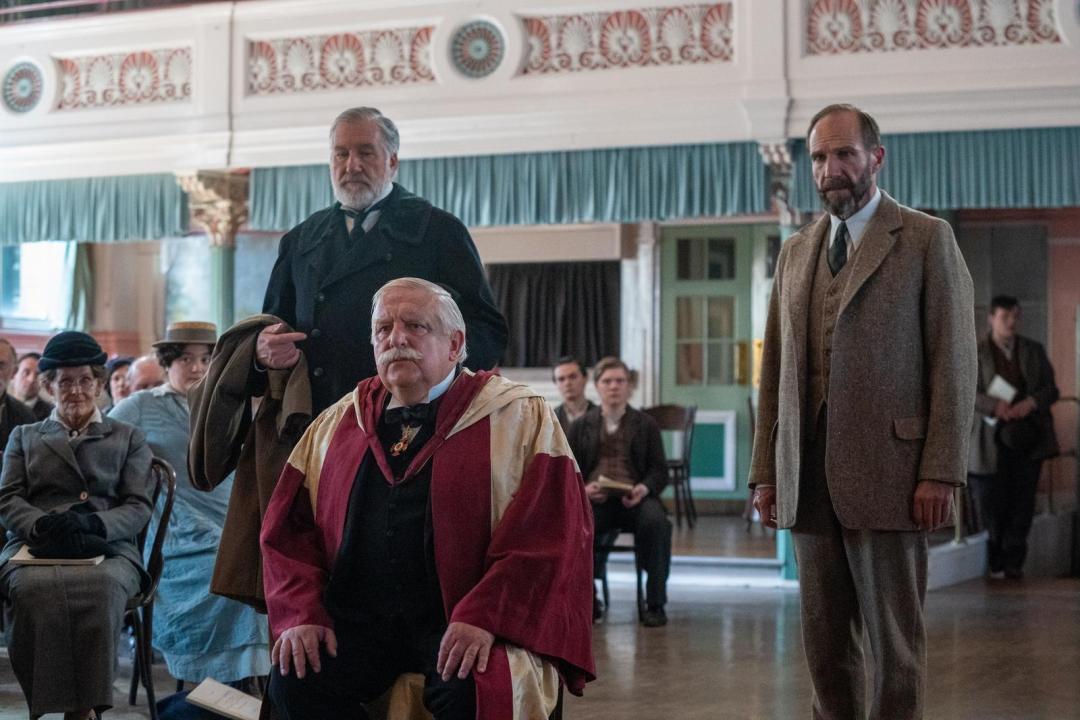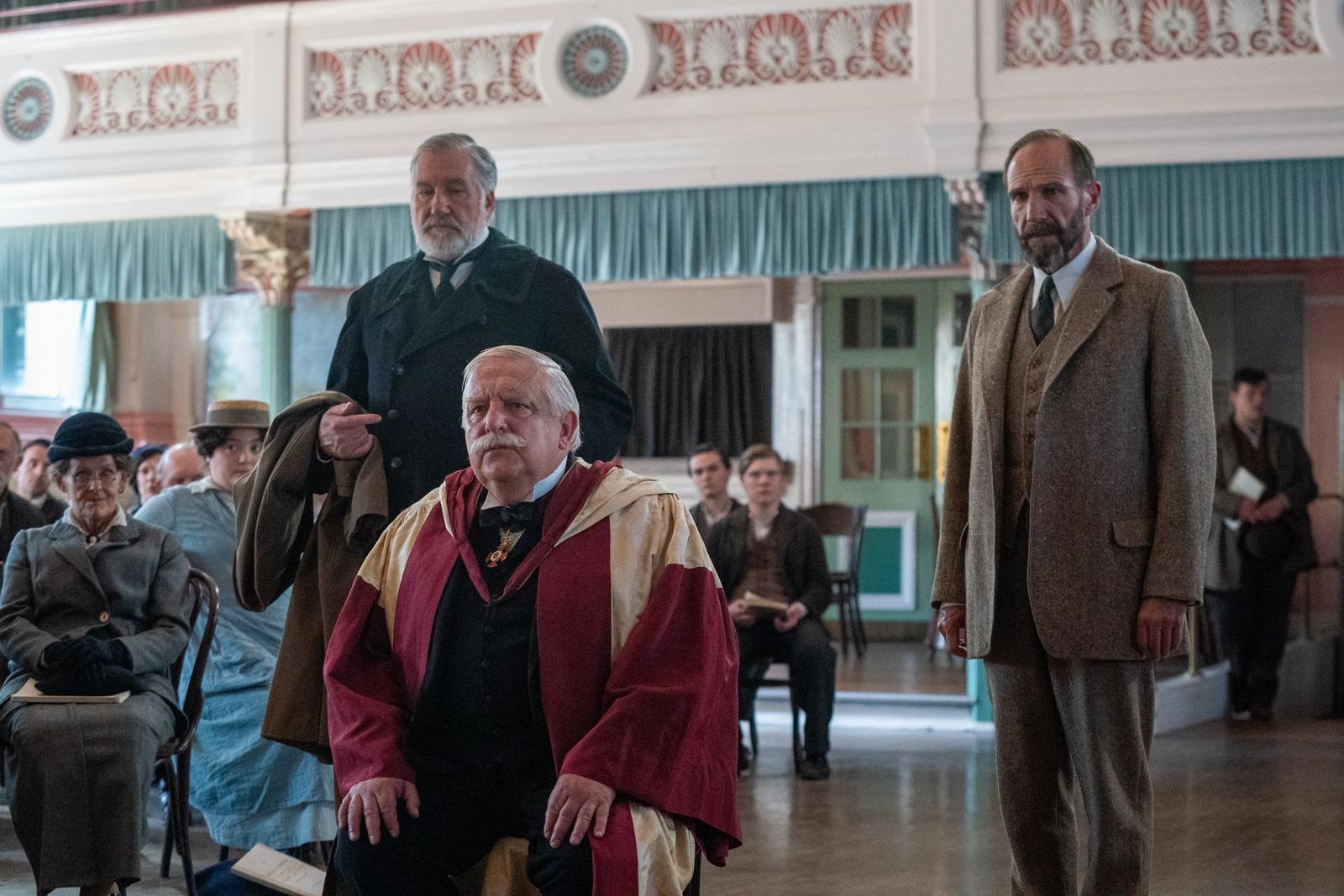There’s not much point pretending to be an expert on Elgar (or so The Bluffer’s Guide to Music assures us) because everyone already thinks they are. And there’s definitely no point getting hung up on the historical accuracy (or otherwise) of Alan Bennett and Nicholas Hytner’s new film The Choral. It’s set in a West Riding mill town during World War One and the plot pivots around the local choral society’s performance of The Dream of Gerontius. This being Bennett, of course, there’s rather more to it than that, but in any case – spoiler alert, and there’ll be more – Sir Edward himself makes a cameo appearance: Simon Russell Beale, looking oddly like the late Ken Russell in a white fright-wig.
So here we go again: imaginative fiction collides with historical reality. Playwrights and directors will protest, rightly, that it’s only a story but history teachers and music writers (and I’ve been both) know what happens next. Peter Shaffer never claimed that Amadeus was anything but a dazzling fantasy but as soon as the movie came out, Mozart became a cackling man-child and four decades on, fiction still wipes the floor with the documented facts. In the forlorn hope of sparing Elgar a similar fate, is it worth trying to tease out what The Choral gets right, historically speaking, and what it invents? Did someone say something about needing a futile gesture at this point in the war?
In truth, the musical storyline is beautifully observed and often very believable. Bennett has been soaked since boyhood in the musical traditions of the Pennines, and George Fenton, who handles the film’s music, is just about the best in the business. If you’re familiar with the period and milieu, Ralph Fiennes’s German-trained choirmaster is a recognisable type. Most British musicians before 1914 aspired to study in Germany and many – including Sullivan, Vaughan Williams and Ethel Smyth – actually did. Bradford’s own Frederick Delius was the son of German immigrants (he was originally christened Fritz). Like Fiennes’s Dr Guthrie, Appleby Matthews (the founder of the City of Birmingham Symphony Orchestra) ended up playing the piano in a local tea-room.
Anyway, the palm court trio with its repertoire of scaled-down G&S, the social and musical gradations of a local choral society, and the particular sound of amateur singers doing their best but still falling short: it’s all lovingly done. A few details ring false, but are necessary for the story. In May 1916 – the very month in which The Choral is set – Elgar conducted two full-scale, sold out performances of Gerontius in Leeds and Bradford, receiving national newspaper coverage. Funnily, Bennett’s Yorkshire music-lovers have never heard of the piece. There’d be no film if they had.
But some persistent myths get a fresh wind in The Choral, and they can’t be rebutted often enough. One was propagated by Elgar himself – the idea that the première of Gerontius at the 1900 Birmingham Triennial Festival was a disaster. That the performance was badly under-rehearsed is beyond dispute (most things were, at the Triennial Festival). That the public hated it, as Dr Guthrie believes in the film, is untrue. The audience was so enthusiastic that they broke the Festival’s ‘no applause’ rule and gave Elgar an ovation; almost unheard-of at that time. Critics were unanimous that the work itself was a masterpiece. ‘I can honestly and frankly say that no composition by an Englishman can equal it’, wrote the Morning Leader. Some failure.
Another myth – more pernicious because it occasionally gets dragged into 21st-century culture wars – is the notion that German music was boycotted in Britain during the first world war. Apart from a single cancelled Wagner night at the Proms in the febrile atmosphere of August 1914 (it was later reinstated), there’s almost no evidence that this ever happened. Far more typical was the attitude (as one correspondent wrote to the Westminster Gazette, in early 1915) that ‘Art recognises no local or racial limitations – it is international’, and Brahms, Beethoven and Wagner were performed across Britain throughout the war.
Bach, too. The choir in The Choral abandons its planned St Matthew Passion after a local jingo lobs a stone through the window. Realistically, that protestor would have had to throw a lot of stones: in 1916 alone, there were performances of the Passion in Eastbourne, Newcastle, Norwich, York and London. And he’d have been in a tiny minority. ‘Those extraordinary so-called patriots who would put an embargo on the music of a German who died more than century and a half ago are happily so rare as to be negligible’, noted the staunchly conservative Yorkshire Post.
That leaves us with Elgar himself: in Bennett’s version (and Beale’s droll performance) a blustering snob, condescending towards his amateur fans. Well, yes; and at the same time, very much no. It’s true that Elgar, a shopkeeper’s son, was insecure, prone to mood-swings and could be horribly rude. At a dinner in his honour at 22 Old Queen Street, London (now the offices of The Spectator) he told a young singer who’d performed one of his songs that ‘you have spoiled my evening’. On the other hand, he was consistently supportive towards the regional choral societies and festivals that performed his music, particularly in the Midlands and the North. He owed them his career. In his own words, ‘The living centre of music in Great Britain is not London, but somewhere further north’, and many would still agree.
Would Elgar have objected – as he does in The Choral – to a certain amount of cutting and rearranging of his music to suit local conditions? Again, it seems not. Excerpts from Gerontius were sung in Bolton (again, in May 1916) with a bare piano accompaniment, which makes the scratch orchestra in The Choral look positively lavish. Far more plausible is the Catholic Elgar’s outrage, in the film, at finding his heartfelt profession of faith rewritten to make it ‘less religious’. Hytner, in an interview with the Times, has expressed distaste for the doctrine of purgatory. Ironically, some of the few serious objections that Gerontius encountered in Elgar’s own lifetime came from Anglican clergy who found its Catholicism repugnant. Some prejudices never grow old.
As for the film’s bizarre climactic performance, in which The Dream of Gerontius is transformed into a sort of am-dram Oh! What a Lovely War five decades before its time – well, thesps will be thesps, I suppose. We should cherish that 1960s generation while we still have it. And certainly, choristers standing in lines and singing aren’t very cinematic. I wish Bennett hadn’t gone there; but I can understand why he did, and suspect that his true feelings about Elgar’s music are closer to Roger Allam’s heartbroken bathroom-tenor of a mill-owner: ‘I just love it so much’. Sir Mark Elder’s Hallé recording of The Dream of Gerontius (for this story, it has to be the Hallé) plays over the closing scenes, with Alice Coote singing the ‘Angel’s Farewell’, and if your eyes don’t start pricking, you’re a tougher moviegoer than I am. You might even be a film critic.
The Choral is out now.







Comments